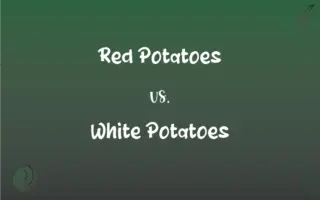Monologue vs. Dialogue: What's the Difference?
Edited by Aimie Carlson || By Harlon Moss || Updated on October 6, 2023
A monologue is a prolonged speech by one person; a dialogue is a conversation between two or more persons.

Key Differences
Monologues and dialogues are both essential tools in the realms of literature, theater, and film, but they serve distinct functions.
A monologue is an extended speech delivered by a single character, offering insight into their thoughts, feelings, and motivations. In contrast, a dialogue is an exchange of words between two or more characters, helping to progress the narrative, develop relationships, and convey information.
Monologues often allow for introspection and give depth to a single character. In plays, they can provide pivotal moments where a character's innermost thoughts are revealed. Conversely, dialogues foster interaction and provide dynamics between characters.
In many theatrical works, dialogues are fundamental to drive the plot forward and reflect real-life conversations. While monologues focus on the individual and their perspective, dialogues provide a platform for conflict, agreement, and the intricacies of interpersonal communication.
Comparison Chart
Definition
Extended speech by one character
Conversation between two or more characters
ADVERTISEMENT
Participants
One
Two or more
Purpose
Reveals internal thoughts or delivers information
Drives narrative, develops character relationships
Representation
Individual's perspective
Interpersonal interactions
Common in
Soliloquies in plays, stand-up comedy
Plays, novels, everyday conversations
Monologue and Dialogue Definitions
Monologue
An unbroken series of words from one speaker.
Her dramatic monologue captivated the audience.
ADVERTISEMENT
Dialogue
An exchange of spoken words in a narrative.
Their heartfelt dialogue brought tears to my eyes.
Monologue
A character's extended expression of internal thoughts.
The villain's monologue revealed his true intentions.
Dialogue
A conversation between two or more characters.
The dialogue between the leads was witty and fast-paced.
Monologue
A prolonged speech by a single character.
His monologue at the end of the play was truly moving.
Dialogue
Interaction through speech in literature or plays.
The sharp dialogue set the stage for an intense showdown.
Monologue
A single character's exposition or reflection.
The protagonist delivered a powerful monologue about love and loss.
Dialogue
Characters communicating verbally.
The dialogue in the novel felt authentic and relatable.
Monologue
A narrative piece by a singular voice.
The comedian's monologue had the crowd in stitches.
Dialogue
A verbal exchange that progresses the narrative.
The romantic dialogue between them was the highlight of the movie.
Monologue
A lengthy, uninterrupted speech by a single character, as in a play or novel.
Dialogue
A conversation between two or more people.
Monologue
A literary composition in monologue form.
Dialogue
A discussion of positions or beliefs, especially between groups to resolve a disagreement.
Monologue
A continuous series of jokes or comic stories delivered by one comedian.
Dialogue
Conversation between characters in a drama or narrative.
FAQs
What's the purpose of dialogue in a narrative?
Dialogue drives the narrative forward, develops character relationships, and conveys information.
What is the main difference between a monologue and dialogue?
A monologue is a long speech by one person; a dialogue is a conversation between two or more people.
Can a monologue be in the form of a poem?
Yes, "dramatic monologue" is a type of poetry where a single speaker expresses their thoughts.
Can a monologue be interactive?
Traditionally, monologues are non-interactive, but some might involve audience engagement, especially in performance arts.
How can dialogues enhance the pacing of a story?
Well-crafted dialogues can add tension, excitement, or emotional depth, influencing the story's pacing.
Can monologues be humorous?
Absolutely! Many comedians use monologues in their routines to deliver humor.
How are dialogues represented in written texts?
In written texts, dialogues are often denoted using quotation marks to indicate spoken words.
Are monologues only found in plays?
No, monologues can be found in novels, films, and even stand-up comedy performances.
How can monologues enhance a character's depth?
Monologues offer insight into a character's thoughts, feelings, motivations, and backstory.
Why is dialogue crucial in narratives?
Dialogue provides a sense of realism, character interaction, and helps in plot advancement.
Do monologues break the fourth wall?
Some monologues might, where the character addresses the audience directly, breaking the imaginary "fourth wall."
How does dialogue contribute to character development?
Dialogue reveals character relationships, histories, conflicts, and personalities through their interactions.
What's a key factor in writing a realistic dialogue?
Authenticity and relatability are vital for crafting realistic dialogues that resonate with readers.
Which is more common in everyday life, monologue or dialogue?
Dialogue is more common as it represents typical conversations between individuals.
Can dialogues occur without any spoken words?
While dialogues are typically verbal, they can be non-verbal, using gestures or actions to convey a conversation.
Why might a writer choose a monologue over dialogue?
A writer might use a monologue to focus on a single character's perspective, feelings, or to deliver specific information.
Can a play have both monologues and dialogues?
Yes, many plays incorporate both monologues and dialogues for varied narrative purposes.
Is a soliloquy a type of monologue?
Yes, a soliloquy is a monologue where a character speaks their inner thoughts aloud, typically alone on stage.
Is a monologue a form of storytelling?
Yes, a monologue can be a powerful storytelling device, narrating events or emotions from a singular perspective.
Can dialogues be internal, like thoughts?
Typically, dialogues are external spoken exchanges, but internal dialogues or "inner dialogues" represent a character's internal debate.
About Author
Written by
Harlon MossHarlon is a seasoned quality moderator and accomplished content writer for Difference Wiki. An alumnus of the prestigious University of California, he earned his degree in Computer Science. Leveraging his academic background, Harlon brings a meticulous and informed perspective to his work, ensuring content accuracy and excellence.
Edited by
Aimie CarlsonAimie Carlson, holding a master's degree in English literature, is a fervent English language enthusiast. She lends her writing talents to Difference Wiki, a prominent website that specializes in comparisons, offering readers insightful analyses that both captivate and inform.






































































